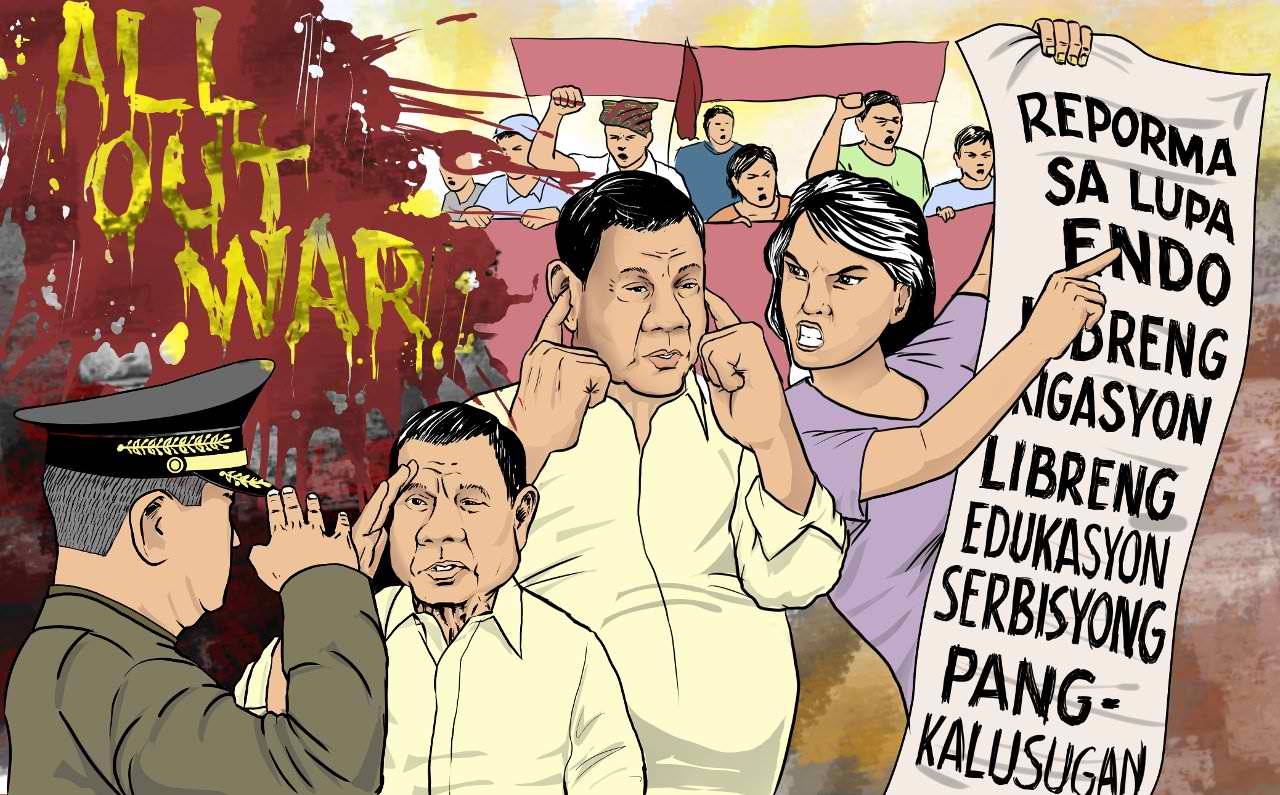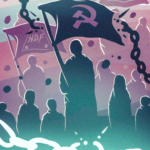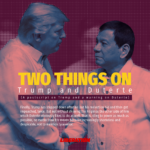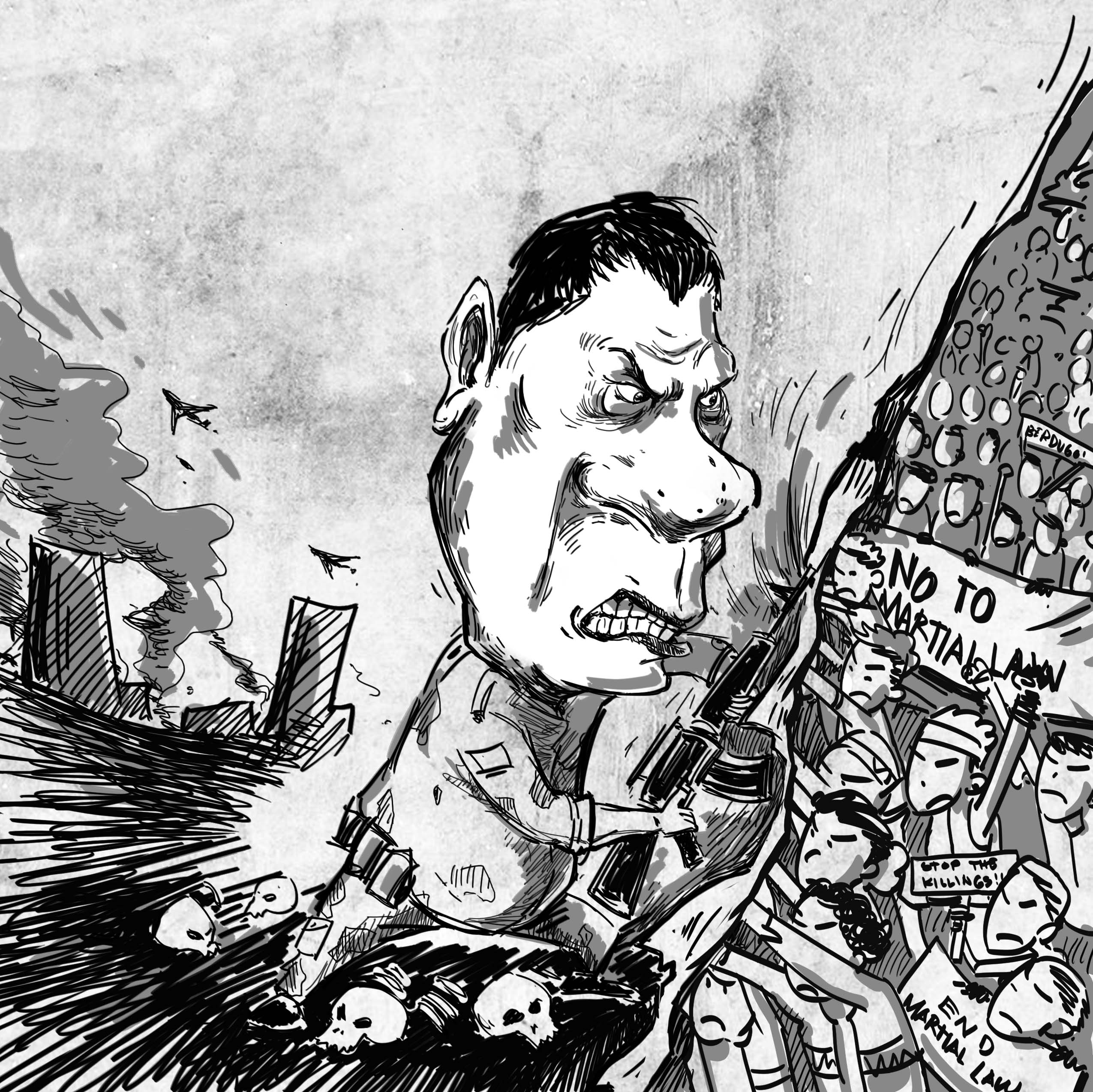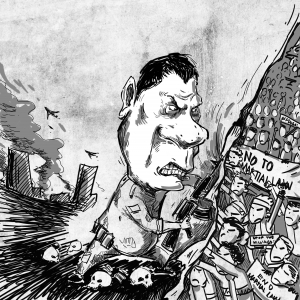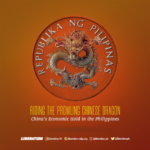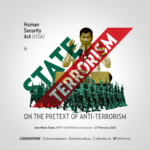On Duterte Government’s First Year: Falterings and Turnarounds

by Angel Balen
Rodrigo R. Duterte was swept into the presidency by a landslide win in the May elections last year on the campaign cry, “Change is coming!” He began his six-year term by taking bold, dramatic moves and making pronouncements in pursuance of his electoral campaign promises.
- He launched his administration’s campaign to eradicate illegal drugs, criminality, and corruption, setting a six-month target to win the “war on drugs”. From the outset it has been a bloody campaign that targeted mainly the poor, who are in fact victims of the drug menace and deserved not death but rehabilitation. He’s emboldened by survey results that say while many acquiesce with the killings, they at the same time express fear they may be the next victims.
- Affirming his declared commitment to end labor contractualization, that for decades has been a bane to the workers and trade unions, Duterte directed his labor secretary to issue the required implementing order. But when the order came out, it was a big letdown. It smashed the high expectations of workers unions and federations of varied persuasions. Alas, the order deviously retains the abominable practice.
- Even before assuming office, Duterte struck an understanding with the National Democratic Front of the Philippines (NDFP)that his government would resume — and complete — the long-stalled GRP-NDFP peace talks aimed at ending the nearly 50 years of armed conflict and attaining “just and lasting peace”. He also offered to free the 400 political prisoners listed by the NDFP through his issuance of an amnesty proclamation as the most expeditious means of releasing them from prison and from the trumped-up common-crime charges filed against them under previous administrations.
He did cause the release, through bail, of 21 NDFP consultants and staff to enable them to participate in the peace talks, and freed a few others later. But he has reneged on his amnesty offer.
The talks resumed with high expectations in August 2016 and gained momentum until the end of January. But since February the situation has changed and continued to deteriorate, prompting Jose Ma. Sison, chief political consultant of the NDFP panel, to write: “…by all major indicators the peace talks are heading for the rocks.”
- Invoking the historical injustices that US imperialism had inflicted on the Filipino people for over a century, Duterte vowed to pursue an “independent foreign policy”. This purportedly aims to veer the nation from long subservience to US foreign policy and dependence on American military aid and protection. On various occasions, he threatened to abrogate the unequal treaties with the US, such as the Visiting Forces Agreement, and to boot out American troops from Mindanao. He began to develop close ties with China and Russia, America’s geopolitical power rivals in Asia and Europe, respectively, hoping to extract from both financial and military aid.
Later, Duterte welcomed and gladly accepted US military aid, troop presence, and interventionist activities in the country.
Duterte has held fast to his “war on drugs,” vowing to carry on the drive till the end of his term. He justifies his bloody methods as the best means to save the lives of Filipino youths from getting ruined. Rejecting, disparaging local and international criticisms and advices on the mounting human rights violations with the arbitrary killings of thousands of suspected drug users and pushers, he has gone as far as threatening to go after human rights advocates.
However, on his commitments to resume and complete the peace talks and to pursue an independent foreign policy — two potentially historic legacies of his government — Duterte has failed to push these onward. The momentum towards change first faltered; now it is being even reversed.
As earlier noted, the peace talks resumed in amity and euphoria. Despite aversion to a prolonged ceasefire, the Communist Party of the Philippines (CPP) and the NDFP agreed to declare an indefinite unilateral ceasefire as a goodwill response to Duterte’s unilateral ceasefire declaration. The ceasefire held for five months, with the New People’s Army (NPA) exercising restraint vis-a-vis the aggressive incursions into and occupation by troops of the Armed Forces of the Philippines (AFP) of communities within the revolutionary base areas. On the negotiating table, the NDFP panel raised the AFP’s actions as ceasefire violations.
Despite this, significant gains were achieved in the next two rounds of formal negotiations (in October 2016 and January 2017) on the substantive issues of economic and social reforms and on the initial discussions on political and constitutional reforms.
A sharp turn happened in early February. Duterte angrily reacted to the killing of three state soldiers intercepted by the Red fighters, after the CPP had announced the withdrawal of its unilateral ceasefire declaration. He cancelled the peace talks and his defense secretary ordered an “all-out-war” against the NPA. Since then the AFP has intensified its offensives using aerial bombings and artillery barrages on upland communities and forested areas, driving away and displacing thousands of civilians.
Although Duterte initiated the continuation of the peace talks in April, he didn’t order to stop the “all-out war”. Worse, his Cabinet security cluster has thrown the proverbial monkey wrench into the formal negotiations: through the GRP panel, it has insisted that negotiations on and signing of a bilateral indefinite ceasefire agreement must come before those for a comprehensive agreement on social and economic reforms. The NDFP absolutely rejects this proposal as it violates The Hague Joint Declaration. Worse, it’s a devious militarist scheme to obtain the capitulation and pacification of the revolutionary forces.
By endorsing his security advisers’ scheme, Duterte has undermined his own commitment to accelerate the negotiations: to forge, sign and approve the comprehensive agreements on social and economic reforms and on political and constitutional reforms and implement them within his term. Thus, he’s forsaking a potential valuable legacy to the Filipino people.
In a similar vein, Duterte has reneged on his pronouncements to do away with US military presence and interventionism. He has allowed the Americans to build military facilities in six military camps and to provide “technical” assistance in the air bombings of Marawi City targetting the Maute group. He has warmly received the US Secretary of State and prepares to welcome President Donald Trump to the country in November.
What explains the faltering and the turnarounds?
Despite his protestations he’s a “socialist” itching to shake up the status quo, he’s revealing his real persona and politics by his actions. As he trucks with his neoliberal economic managers to keep social, economic and political conditions essentially as they have been for decades, he eggs on his pro-US militarist advisers and troops in the counterinsurgency drive “to flatten the hills” through air and ground bombardments. His quickness to adopt militaristic and authoritarian measures — such as declaring martial law and suspending the privilege of the writ of habeas corpus in the whole of Mindanao, with intimation of extending these to cover the entire country — is veritable evidence of what he wishes to be and to do.
It’s fine that within a short period Duterte has unraveled his true self. The revolutionary movement need no longer seriously try to play along with his posturing for change and for peace. Unequivocally, the movement and the organized masses will engage him as what he says he has become. Brandishing his mantle as commander-in-chief of all the reactionary state’s armed forces, he tells his erstwhile friends: “I am your enemy!”
